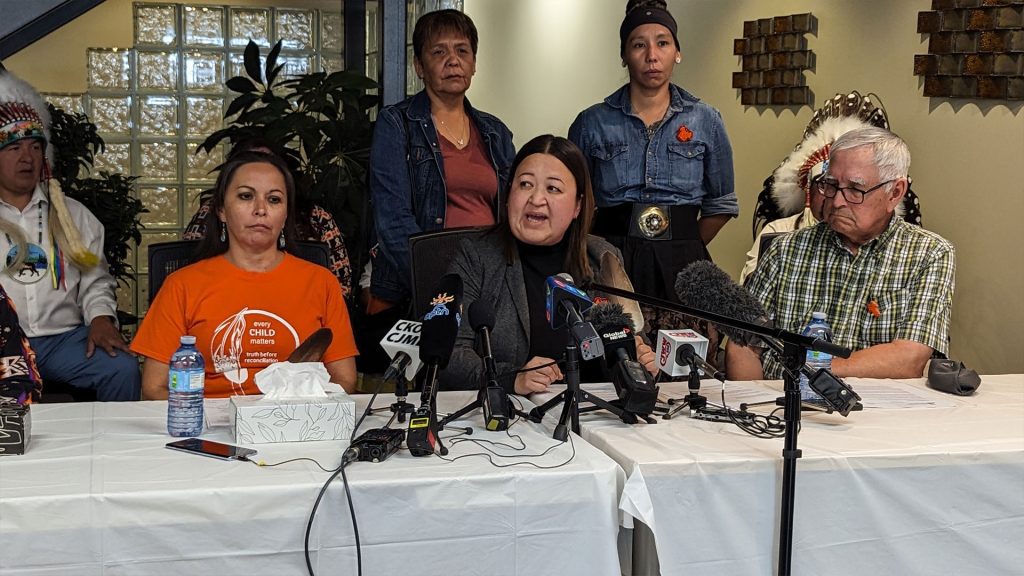
Chief Wolverine and Dawn McIntyre speak to media about potential unmarked graves
Warning: This story contains information that may be distressing to residential school survivors.
English River First Nation in Saskatchewan announced Tuesday it has discovered nearly 100 potential unmarked graves at the site of a former residential school.
Based on the size and shape of the suspected graves, Chief Jenny Wolverine said 79 are believed to be children and 14 are believed to be infants.
Earlier this month the northern Saskatchewan nation, about 650 km from Regina, said it had completed a two-year search using ground-penetrating radar [GPR] and detected findings consistent with unmarked graves.
The majority of the searches were conducted within the residential school cemetery and the graves were unmarked. The search compared marked and unmarked graves using GPR as a part of the verification.
Schools “should come with playgrounds, not graveyards,” said Wolverine at a news conference in Saskatoon.
She said she is asking the “government and Canada to accept the wrong … acknowledge the cultural genocide of First Nations and Métis nations.”
Joining representatives from English River were officials with Meadow Lake Tribal Council, the Federation of Sovereign Indigenous Nations, the Metis Nation-Saskatchewan and the Office of the Treaty Commissioner.
Read more:
How ground-penetrating radar is used to find unmarked graves at residential schools
Dawn McIntyre, who helped coordinate the GPR search, said “most, if not all, of these unmarked graves are believed to be children … based on the measurements of the soil disturbances.”
She told reporters the search involved GPR as well as geoscience and “archeological expertise” to determine the number of possible unmarked graves.
As work continues to finalize the number of graves, the community said it plans to use archival information to help identify the deceased.
“At this point we are going to try and rely on the records we have been able to obtain … we would only consider exhumation as a last resort,” McIntyre said.
Wolverine and other community members made a plea for the further implementation of the Truth and Reconciliation calls to action, including the installation of culturally appropriate memorials in local communities.
The residential school near Lac la Plonge, a glacial lake in northern Saskatchewan, was operated by the Roman Catholic Church from 1906 to 1969, when it came under federal control. Sixteen different communities in the north had to send their children to the institution.
Nineteen boys and one teacher died in 1927 when the school and its convent caught on fire.
The Meadow Lake Tribal Council took full control of the school in 1985, and the residence was closed 10 years later.
The National Centre for Truth and Reconciliation has a record of 52 children’s deaths at the school.
With files from the Canadian Press
The National Indian Residential School Crisis Line provides 24-hour crisis support to former Indian Residential School students and their families toll-free at 1-866-925-4419.
Individuals impacted by the issue of Missing and Murdered Indigenous Women and Girls are encouraged to contact the MMIWG Crisis Line toll-free at 1-844-413-6649.
First Nations, Inuit and Métis seeking immediate emotional support can contact the Hope for Wellness Help Line toll-free at 1-855-242-3310, or by online chat at hopeforwellness.ca.










